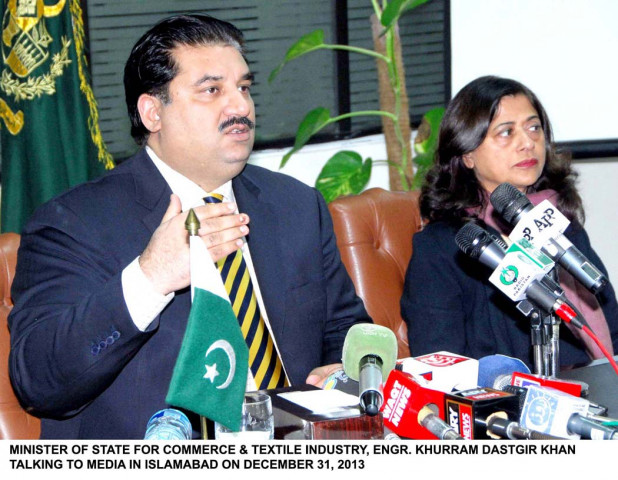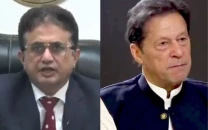For GSP Plus, Pakistan sets up group to track implementation of UN conventions
The GSP Plus status will come into effect at midnight on January 1, 2014.

Minister of State for Commerce and Textile Industry Khurram Dastgir Khan informed on Tuesday that the group, setup in the Foreign Office, will monitor progress on implementation of 27 UN conventions. The move has been deemed necessary if Pakistan wants to remain eligible to avail the ten-year duty free access to the European Union markets.
Addressing a press conference on the technical aspects of the GSP Plus, he further shared details of the incentives that the EU had recently granted Pakistan.
Pakistan has ratified most of the required UN conventions that mainly pertain to human rights, labour rights, women, children, minority rights and freedom of expression.
Dastgir said the major challenge lay in tracking progress on conventions in coordination with provinces, as most of the matters are related to the federating units. “Full compliance was not possible even by the developed nations but Pakistan will assure that there is significant progress.”
New status in effect from New Year
“At midnight, a new door for expanding trade and attracting foreign investment will be opened for the next ten years,” announced Dastgir.
Pakistan will remain a beneficiary as long as its exports to the EU remain less than 2% of the total imports of the EU.
To ensure that Pakistan doesn’t breach the 2% limit, a committee has been formed in the FBR to monitor the exports on weekly basis, said Dastgir. He said the government will also make sure that the textile sector does not face liquidity crunch and all due duty drawbacks and refunds are paid in timely fashion.
Pakistan will also have to undertake steps to ratify the 27 UN conventions, accepts monitoring every two years and reports in accordance with the conventions, said Textile Division secretary Rukhsana Shah.
The first inspection is expected in January, 2016. The European Commission will present a report to the European Parliament and European Council on the status of ratification of the relevant conventions, said Shah. The report will include recommendations on relevant monitoring bodies and whether the beneficiary country has respected its binding undertakings to comply with reporting obligations.
If the beneficiary country no longer fulfils the conditions or withdraws any of its binding undertakings, the EU may withdraw the concessions, the Shah warned.
The EU can also withdraw concessions if Pakistan’s exports increase by at least 13.5% in quantity, as compared to the previous calendar year. The concessions can also be withdrawn if products exceed 6% of the total EU imports of that product.
Exports to go up
She said at present the total EU textile imports were $234 billion and Pakistan’s textile exports stood at $3.68 billion or 1.57% of the EU textile imports.
“Keeping all other factors constant, Pakistan can now achieve an annual increase of 29% in total exports to EU”, declared Shah. The increase in textiles and clothing exports is expected at 38%. In absolute terms, the government has estimated $1.17 billion per anum additional gain in the first year.
According to the EU decision, the products exported by Pakistan will be entitled for duty free status if these are wholly obtained in Pakistan or sufficiently worked or processed there. However, the EU has allowed intermediate products imported from Bangladesh, India, Bhutan, Maldives, Nepal and Sri Lanka that are processed in Pakistan to also be entitled for duty free access aimed at promoting regional trade.
Shah said tariff advantage was the maximum for the apparel sector and the sector should gear up towards value added market.
Due to China and India’s expulsion from GSP plus, Pakistan was well positioned to take advantage of the scheme. She said that Pakistan can gain advantages by increasing exports of printed bed linen, cotton trousers, dyed and printed towels, socks and cotton jerseys.



















COMMENTS
Comments are moderated and generally will be posted if they are on-topic and not abusive.
For more information, please see our Comments FAQ